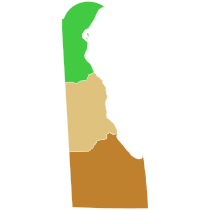| |||||||||||||||||
| |||||||||||||||||
 Mitchell: 50–60% 60–70% Haslet: 60–70% | |||||||||||||||||
| |||||||||||||||||
The 1804 Delaware gubernatorial election was held on October 2, 1804.
Contents
Incumbent Democratic-Republican Governor David Hall was not eligible for re-election under the Delaware Constitution of 1792.
Federalist nominee Nathaniel Mitchell defeated Democratic-Republican nominee Joseph Haslet with 52.02% of the vote.
